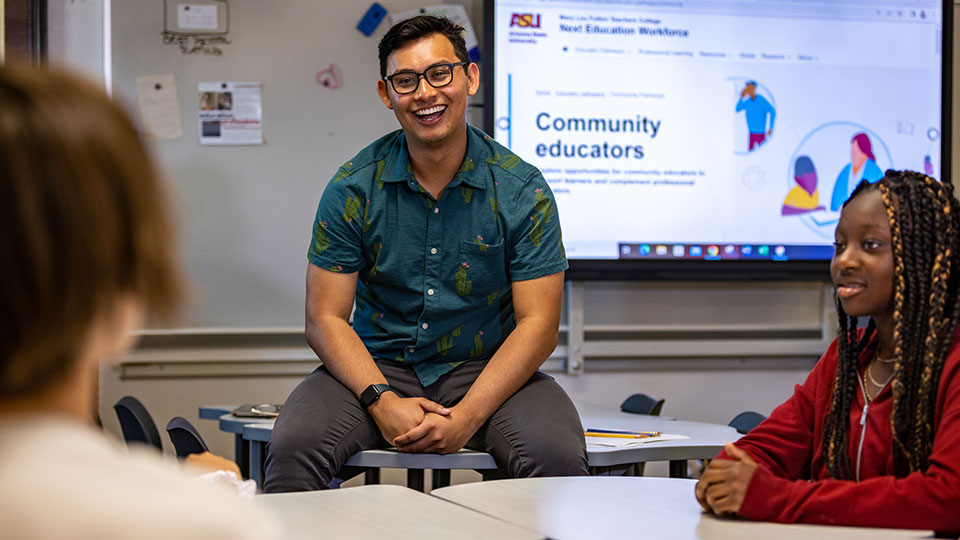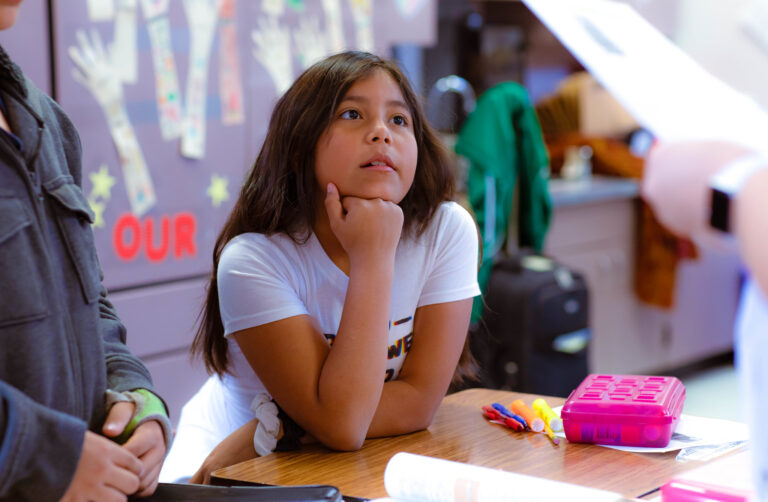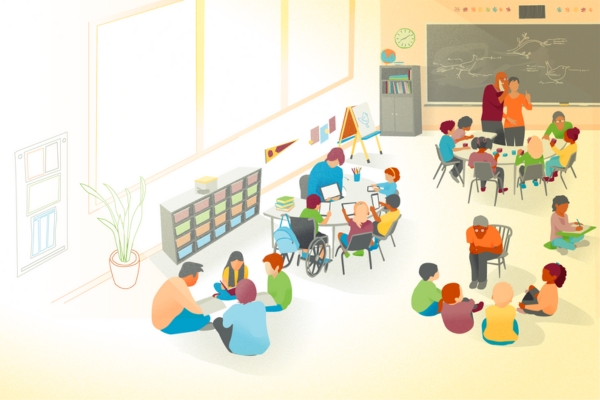
Results
Early research on Next Education Workforce models shows promising results. Learn how team-based strategic school staffing models are improving outcomes and experiences for both students and educators.
Teachers again are excited and that is boiling over to our students being excited.
Vice principal
The teachers are awesome. I feel like I can get all my work done with more teachers to help me.
9th grade student
Outcomes for educators
Teams support higher job satisfaction, lower turnover rates and greater educator effectiveness
In Next Education Workforce models, educators have opportunities to acquire expert depth, explore functional breadth and advance in ways that don’t necessarily require leaving the classroom. While teams look different in each context, this approach to team-based staffing models emphasizes educators’ distributed expertise. Educators can showcase their skills in a supportive environment, leading to higher job satisfaction, better student outcomes and a high degree of collaboration, which is difficult to attain in the traditional one-teacher, one-classroom model.
Educators in Next Education Workforce models have …
- Lower turnover rates: On average, team-based educators have lower turnover rates compared to traditionally-staffed educators. Lead teachers and novices are retained at even higher rates.
- Greater satisfaction: Team-based educators report greater satisfaction than educators in traditional classroom models and are also more likely to recommend the profession to a friend.
- Educator effectiveness: Team-based educators are more likely to be rated highly effective in evaluations, even when controlling for years of experience and previous evaluation ratings.
- More collaboration and support: Teachers express a sense of relief due to being part of a team. Team-based educators at one Arizona school emphasized the importance of a collaborative environment, which allowed them to share experiences and enhance their teaching practices.

Outcomes for students
Teams support the development of broader student outcomes

Students served by Next Education Workforce teams experience more …
- Academic growth: Students served by Next Education Workforce educator teams made 1.4 more months of reading growth than students in traditional models.
- Engagement and connection: At one Arizona high school, site leaders reported greater engagement levels and feelings of connection to the school among students supported by educator teams. Students highlighted relationships with teachers and inquiry-based learning as reasons they felt more involved and connected.
- Self-efficacy: Site leaders also reported an increase in students’ confidence in their school-related abilities and belief they could succeed academically among students served by educator teams.
- Collaboration: Students report more opportunities to collaborate with both their teachers and peers.
From the blog
Explore recent articles and blog posts for more insights about the Next Education Workforce and team-based school staffing models.

Team-based school staffing expands across states, improving outcomes and experiences for students and educators
Across 16 U.S. states and two countries, educators are working in teams rather than alone, creating more student-centered learning environments while building careers that are collaborative, sustainable and satisfying. In just seven years, Next Education Workforce™ team-based staffing models have grown from a single school to 128 schools serving roughly 33,000 students.

Next Education Workforce teachers experience lower turnover
New research from the Center for Reinventing Public Education highlights the promise of team-based staffing models in tackling one of education’s most persistent challenges: teacher retention.
In the news
Delaware News Journal
October 6, 2025
State of Delaware News
September 29, 2025
The State Press
September 24, 2025
Theory of action
How do Next Education Workforce models improve outcomes?
Next Education Workforce school staffing models aim to improve educator, student and system outcomes by creating teams of educators with distributed expertise. We theorize that changing the roles and responsibilities of educators and creating student-centered learning environments allow for these changes.
Research agenda
What are we currently researching and planning on studying next?
The current literature supports our theory that improving teacher working conditions and supporting teacher collaboration and diversity will lead to improved student outcomes. We are conducting research to interrogate our model and plan to employ quasi-experimental difference-in-difference methods to study the causal impact of teams on both educator and student outcomes. As our work expands, we also plan to study and track how systems-level outcomes improve in places where our work is deepening, to ensure we are meeting our broader vision for the future of the education system.
Implementation and Scaling
- The model: How are Next Education Workforce models implemented? How does implementation vary across contexts?
- Transformation: How do schools and systems move from more traditional models to sustainable Next Education Workforce models?
- Conditions: What are the required resources and enabling conditions that allow for scale-up of Next Education Workforce models beyond initial adopters? What policies support or inhibit implementation?
Impact
- Educators: Do Next Education Workforce models improve educator outcomes? Key outcomes include satisfaction, retention, effectiveness, diversity
- Students: Do Next Education Workforce models improve student outcomes? Key outcomes include academic growth, attendance, sense of belonging, whole child outcomes, network of support
- Schools and Systems: Do Next Education Workforce models improve systems-level outcomes? Key outcomes include enrollment, educator recruitment and retention, family satisfaction
Mechanisms
- Essential elements: What are the essential elements of Next Education Workforce models that lead to improved outcomes? Are particular elements more important at key transformational stages?
- Variation: How do impacts vary across students, educators, schools and systems? Under what conditions are these models most successful?
Publications and presentations
| Title | Publication | Type | Date published | Author(s) |
|---|---|---|---|---|
| Title: The Teaching Models That’s Keeping Educators in Schools | Publication: ASCD | Type: Journal article | Date published: April 2025 | Author(s): Audrain, R.L., Ingersoll, R. M. |
| Title: Better Together: Team-based staffing in secondary school | Publication: Principal Leadership | Type: Journal article | Date published: November 2024 | Author(s): Gilmore, C., Harris, V., Maddin, B., Audrain, L. R. |
| Title: Envisioning Educator Roles for Transformation | Publication: KnowledgeWorks | Type: Resource | Date published: August 2024 | Author(s): Contributed: Lennon Audrain, Ashley Katikos, Lindsay DiMartino and Tanya Pinkerton |
| Title: Early evidence of improved educator outcomes in Next Education Workforce models | Publication: Center on Reinventing Public Education | Type: Report | Date published: May 2024 | Author(s): Mary Laski |
| Title: Sustaining Teachers Through Collaboration and Autonomy: Outcomes of a Professional Development Experience | Publication: The New Educator | Type: Journal article | Date published: April 2023 | Author(s): Audrain, R.L., Ruiz, E.A., Wyatt, L. G., Nailor, N., Weinberg, A.E. |
| Title: ASU’s Networked Cohorts: Forging Enduring Virtual Communities Among Teachers Amidst the COVID-19 Pandemic | Publication: Department of Education's Best Practices Clearinghouse | Type: Resource | Date published: March 2023 | Author(s): Lisa Wyatt, Natalie Nailor, Brent Maddin, Lennon Audrain, Andrea Weinberg |
| Title: Teacher academies that make a difference NOW | Publication: Kappan | Type: Journal article | Date published: February 2023 | Author(s): R. Lennon Audrain, Gregory Mendez |
| Title: The Next Education Workforce | Publication: School Administrator | Type: Journal article | Date published: March 2022 | Author(s): Basile, C., Maddin, B. |
| Title: Professional Pathways: Redefining School and University Partnerships | Publication: Rethinking School-University Partnerships: A New Way Forward | Type: Book chapter | Date published: August 2021 | Author(s): Kathleen Puckett, Jessica DeBiase, William Butler, Brent Maddin |
| Title: Educational Change by Design: Creating a School of the Future | Publication: Journal of Cases in Educational Leadership | Type: Journal article | Date published: December 2020 | Author(s): Lisa G. Wyatt, Benjamin S. Scragg, Jennifer Y. G. Stein, Punya Mishra |
| Title: SPARK-ing innovation: a model for elementary classrooms as COVID-19 unfolds | Publication: Journal of Professional Capital and Community | Type: Journal article | Date published: August 2020 | Author(s): Jeanne M. Powers, Mary Brown, Lisa G. Wyatt |
| Venue | Date Presented | Location | Presenter(s) |
|---|---|---|---|
| Venue: Teacher-Powered Schools National Conference | Date presented: October 2025 | Location: Ypsilanti, MI | Presenter(s): Klein, D., Dry, H., Solomon. L. |
| Venue: Partnership for Student Success Higher Education Summit | Date presented: October 2025 | Location: Washington, D.C. | Presenter(s): Conn, L., Barnett, M., Elson, L. |
| Venue: Tennessee State University SMART Immersive Technology Center, STEM Alliance | Date presented: September 2025 | Location: Nashville, TN | Presenter(s): Maresso Wyatt, L. |
| Venue: National Institute of Teaching | Date presented: September 2025 | Location: Birmingham, U.K. | Presenter(s): Maddin, B., Barker, J. |
| Venue: ConnectED 2025: Consortium of Florida Education Foundations | Date presented: September 2025 | Location: Orlando, Florida | Presenter(s): Maddin, B., Fourlis, A., Harris, V. |
| Venue: ASU+GSV Summit | Date presented: April 2025 | Location: San Diego, CA | Presenter(s): Maddin, B., Audrain, L., Mahlerwein, R. |
| Venue: CityTutor DC High-Impact Tutoring Summit | Date presented: April 2025 | Location: Washington, D.C. | Presenter(s): Conn, L. |
| Venue: Yidan Prize Conference: Meeting the future of teaching and learning | Date presented: March 2025 | Location: Tempe, AZ | Presenter(s): Maddin, B., Colbert, V., Darling-Hammond, L., Reshef, S. |
| Venue: National Conference on Education | Date presented: March 2025 | Location: New Orleans, LA | Presenter(s): Audrain, R. L., Matzke, L., Fremstad, J., Gandhi, R., McCanna, J. |
| Venue: National Conference on Education | Date presented: March 2025 | Location: New Orleans, LA | Presenter(s): Maddin, B., Vesely, J., Fourlis, A., Toenjes, L., Hutchinson, R., Niedermeier, J., Reutter, J. |
| Venue: Partnership for Student Success: Attendance Solutions Network Showcase | Date presented: January 2025 | Location: Virtual | Presenter(s): Adams, K. |
| Venue: Council of Chief State Schools Officers Annual Policy Forum | Date presented: November 2024 | Location: Phoenix, AZ | Presenter(s): McGrath, M., Maddin, B. |
| Venue: AAEE 2024 Annual Conference | Date presented: October 2024 | Location: Denver, CO | Presenter(s): LaRocca, A. |
| Venue: AASPA National Conference | Date presented: October 2024 | Location: Seattle, WA | Presenter(s): Audrain, R.L. |
| Venue: National Partnership for Student Success Higher Education Summit | Date presented: October 2024 | Location: Washington, D.C. | Presenter(s): Adams, K., Conn, L. |
| Venue: Arizona Rural Schools Association Conference | Date presented: October 2024 | Location: Flagstaff, AZ | Presenter(s): Basile, C. |
| Venue: Congressional Subcommittee on Early Childhood, Elementary, and Secondary Education Hearing | Date presented: September 2024 | Location: Washington, D.C. | Presenter(s): Basile, C. |
| Venue: Global Network of Deans of Education Conference | Date presented: September 2024 | Location: Innsbruck, Austria | Presenter(s): Basile, C., Ledger, S. |
| Venue: National Charter Schools Conference | Date presented: July 2024 | Location: Boston, MA | Presenter(s): Audrain, R. L., Laski, M., McGrath, A. |
| Venue: University of Glasgow Teacher Education Symposium | Date presented: May 2024 | Location: Glasgow, Scotland | Presenter(s): Basile, C. |
| Venue: Schusterman Family Philanthropies Spring Professional Learning Community | Date presented: May 2024 | Location: Washington, D.C. | Presenter(s): Fu, C., Maddin, B., Rosenberg, D. |
| Venue: NewSchools Summit | Date presented: May 2024 | Location: San Francisco, CA | Presenter(s): Wyatt, L., Audrain, L., Mendez, L., Maday, S., Brooks, A. |
| Venue: ASU+GSV Summit | Date presented: April 2024 | Location: San Diego, CA | Presenter(s): Basile, C., Rawe, K., Baranwal, S., Miyashiro, D. |
| Venue: Emerson/XQ | Date presented: April 2024 | Location: Palo Alto, CA | Presenter(s): Audrain, R. L. |
| Venue: Future of Learning Community (FOLC) Fest | Date presented: March 2024 | Location: Tempe, AZ | Presenter(s): Conn, L., Adams, K. |
| Venue: Elevating the teaching profession: A national conversation on the future of teaching | Date presented: March 2024 | Location: Washington, D.C. | Presenter(s): Hess, D., Gist, C., Maddin, B., Hise, R. |
| Venue: Council for Exceptional Children (CEC) Conference | Date presented: March 2024 | Location: San Antonio, TX | Presenter(s): Thompson, B., Hoffman, K. |
| Venue: Association for Education Finance & Policy Annual Conference | Date presented: March 2024 | Location: Baltimore, MD | Presenter(s): Bjorklund-Young, A., Watson, A, Passarella, A |
| Venue: Carnegie Foundation Summit on Improvement in Education | Date presented: March 2024 | Location: San Diego, CA | Presenter(s): Honigsberg, L., Ochi, C. |
| Venue: American Association of Colleges for Teacher Education | Date presented: February 2024 | Location: | Presenter(s): Lennon Audrain, Natalie Nailor |
| Venue: School Administrators of Montana Institute | Date presented: February 2024 | Location: Helena, MT | Presenter(s): Vesely, J. |
| Venue: Arizona School Personnel Administrators Association (ASPAA) Fall Conference | Date presented: November 2023 | Location: Prescott, AZ | Presenter(s): Brent Maddin, Justin Wing |
| Venue: American Association of Colleges of Teacher Education (AACTE) State Leaders Institute | Date presented: November 2023 | Location: Virtual | Presenter(s): White-Smith, K., King, J., Gangone, L., Maddin, B. |
| Venue: ASUxSNUE Teacher Training Symposium | Date presented: October 2023 | Location: Seoul, South Korea | Presenter(s): Basile, C., Ludlow, C. |
| Venue: AACE National Conference 2022 | Date presented: October 2023 | Location: | Presenter(s): S. Baptiste, E. Mote, Brent Maddin |
| Venue: Aurora Institute Symposium | Date presented: October 2023 | Location: Palm Springs, CA | Presenter(s): Hernandez-Lavezzo, J., Livesey, G., Busseault, B., Wyatt, L. |
| Venue: American Enterprise Institute Fall Working Group Meeting | Date presented: October 2023 | Location: Washington, D.C. | Presenter(s): Maddin, B. |
| Venue: National Charter Schools National Conference | Date presented: June 2023 | Location: Austin, TX | Presenter(s): Brent Maddin, Lisa Cannon, Betsy Fowler |
| Venue: ASU+GSV Summit | Date presented: April 2023 | Location: San Diego, CA | Presenter(s): Basile, C., Beghetto, R., Branstetter, L., Fourlis, A., Maddin, B., Weil, R. |
| Venue: Council of Chief State School Officers National Summit | Date presented: April 2023 | Location: Washington, D.C. | Presenter(s): Basile, C. |
| Venue: West Ed Rural Communities of Practice | Date presented: March 2023 | Location: | Presenter(s): Kaycee Salmacia, Kevin Corner |
| Venue: SXSW EDU | Date presented: March 2023 | Location: Austin, TX | Presenter(s): Brent Maddin, R. Lennon Audrain, Patricia Christie |
| Venue: AASA National Conference on Education | Date presented: February 2023 | Location: San Antonio, TX | Presenter(s): Basile, C. |
| Venue: EdPrepLab Policy Summit | Date presented: January 2023 | Location: Virtual | Presenter(s): Basile, C., Crawford, C., Darling-Hammond, L., Rodriguez, R. |
| Venue: AASPA’s National Educator Shortage Summit | Date presented: January 2023 | Location: New Orleans, LA | Presenter(s): Brent Maddin |
| Venue: AASPA Human Capital Leadership Summit 2022 | Date presented: December 2022 | Location: | Presenter(s): Justin Wing, Brent Maddin |
| Venue: ASPAA 2022 Fall Conference | Date presented: November 2022 | Location: | Presenter(s): Justin Wing, Brent Maddin |
| Venue: American Association for Employment in Education (AAEE) Conference | Date presented: October 2022 | Location: Baltimore, MD | Presenter(s): Sabrina Baptiste, Brent Maddin |
| Venue: AZBEC Annual Conference | Date presented: October 2022 | Location: Virtual | Presenter(s): Basile, C., Fourlis, A., Acosta, D., Adams, K. |
| Venue: Dublin City University Institute of Education | Date presented: September 2022 | Location: Dublin, Ireland | Presenter(s): Basile, C. |
| Venue: Saxion University | Date presented: September 2022 | Location: Enschede, Netherlands | Presenter(s): Basile, C., Ludlow, C., Oakes, W. P. |
| Venue: Lancaster County STEM Alliance Conference | Date presented: August 2022 | Location: Lancaster, PA | Presenter(s): Basile, C. |
| Venue: 75th Education Writers Association National Seminar | Date presented: July 2022 | Location: Orlando, FL | Presenter(s): Neal Morton (Moderator), Vatricia Harris, Julia Kaufman, Brent Maddin |
| Venue: Council of State Governments West (CSG West) Annual Meeting | Date presented: July 2022 | Location: Boise, ID | Presenter(s): Brent Maddin, Katie Rhodenbaugh |
| Venue: NewSchools Venture Fund Summit 2022 | Date presented: May 2022 | Location: Virtual | Presenter(s): Brent Maddin (Moderator), AJ Gutierrez, Mallory Dwinal-Palisch, Kareem Farah |
| Venue: ASU + GSV 13 | Date presented: April 2022 | Location: San Diego, CA | Presenter(s): Aylon Samoa (Moderator), Morcease Beasely, Brent Madidn, Ty’Relle Stevens, Natasha Trivers |
| Venue: ASU+GSV Summit | Date presented: April 2022 | Location: San Diego, CA | Presenter(s): Basile, C. |
| Venue: SXSW EDU | Date presented: March 2022 | Location: Austin, TX | Presenter(s): Brent Maddin, Greg Mendez, Kimberly Wright |
| Venue: AACTE 74th Annual Meeting | Date presented: March 2022 | Location: New Orleans, LA | Presenter(s): Basile, C. |
| Venue: AASA National Conference on Education | Date presented: February 2022 | Location: Nashville, TN | Presenter(s): Basile, C. |
| Venue: National Charter Schools National Conference | Date presented: June 2021 | Location: Virtual | Presenter(s): Brent Maddin, Claudia Mendoza, Natalie Nailor |
| Venue: Digital Learning Collaborative | Date presented: June 2021 | Location: | Presenter(s): |
| Venue: American Educational Research Association | Date presented: April 2021 | Location: | Presenter(s): |
| Venue: National Educational Seminar, Center for Cultural Studies and Educational Research | Date presented: March 2021 | Location: Virtual | Presenter(s): Basile, C. |
| Venue: Excel in ED: EdPalooza | Date presented: December 2020 | Location: Virtual | Presenter(s): Brent Maddin |
| Venue: ExcelinEd EdPalooza | Date presented: December 2020 | Location: Virtual | Presenter(s): |
| Venue: University Council on Educational Administration | Date presented: November 2020 | Location: | Presenter(s): |
| Venue: Madac Education Forum | Date presented: October 2020 | Location: Virtual | Presenter(s): Basile, C. |
| Venue: MADAC Education Forum | Date presented: October 2020 | Location: Virtual / Saudi Arabia | Presenter(s): Jennifer Stein, Ruhi Khan, Brent Maddin |
| Venue: MADAC School | Date presented: September 2020 | Location: Virtual, Saudi Arabia | Presenter(s): Brent Maddin, Ruhi Kahn, Jennifer Stein |
| Venue: Council of Chief State School Officers (CCSSO) Webinar: Strengthening Teacher’s Ability to Use and Adapt Curriculum in Teacher Preparation | Date presented: June 2020 | Location: Virtual | Presenter(s): D. Burson, Tenette Smith, K. Wells-Wynn, Brent Maddin |
| Venue: Carnegie Summit on Improvement in Education | Date presented: April 2020 | Location: San Francisco, CA | Presenter(s): Basile, C. G., Thompson, N. L. |
| Venue: AACTE National Conference | Date presented: February 2020 | Location: Altanta, GA | Presenter(s): Lisa Wyatt, Mary Brown, Jeanne Powers |
| Venue: American Association of Colleges for Teacher Education | Date presented: February 2020 | Location: Atlanta, GA | Presenter(s): Basile, C., Steer, L., Arkorful, K., Atherton, P., Johnson, D., Mlambo, Y. |
| Venue: Schusterman Learning to Teach | Date presented: December 2019 | Location: Denver, CO | Presenter(s): Brent Maddin, Stephanie Dean |
| Venue: Arizona Educators Rising Fall Leadership Conference | Date presented: October 2019 | Location: Tempe, AZ | Presenter(s): Ashley Katikos, William Butler, Kelly Owen, Brent Maddin |
| Venue: VIPKid Regional Convening | Date presented: September 2019 | Location: Las Vegas, NV | Presenter(s): Brent Maddin |
| Venue: VIP Kid Journey | Date presented: September 2019 | Location: Las Vegas, NV | Presenter(s): Brent Maddin |
| Venue: Learning To Teach 2019 | Date presented: June 2019 | Location: Denver, CO | Presenter(s): Stephanie Dean, Brent Maddin |
| Venue: OLC Innovate | Date presented: April 2019 | Location: Denver, CO | Presenter(s): Brent Maddin, Michael Stewart |
| Venue: Next Education Workforce Convening | Date presented: January 2019 | Location: Washington, D.C. | Presenter(s): Basile, Carole |
| Venue: New Mexico’s Future Educator Preparation Summit | Date presented: November 2018 | Location: Albuquerque, NM | Presenter(s): Brent Maddin |
| Venue: LEAP innovatED Summit | Date presented: August 2018 | Location: Chicago, IL | Presenter(s): Albert Bertani (Modertator), Brent Maddin, Robert Muller, Aneesh Sohoni |
| Venue: National Education Leaders’ Workshop | Date presented: March 2018 | Location: San Diego, CA | Presenter(s): Basile, Carole |
| Venue: AASA Learning 2025 National Convening | Date presented: | Location: Washington, D.C. | Presenter(s): Justin Wing, Brent Maddin |
| Venue: Sustainable + Affordable Residency Webinar Series sponsored by the Bill and Melinda Gates Foundation | Date presented: | Location: Virtual | Presenter(s): Brent Maddin, Nicole Thompson, Robert Morse, Justin Wing |
| Venue: New Mexico Teacher Summit | Date presented: | Location: Albuquerque, NM | Presenter(s): Brent Maddin |